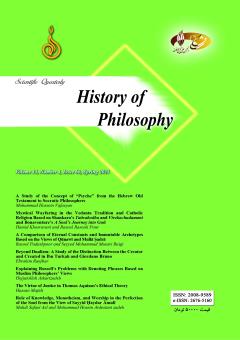A Comparison of Eternal Constants and Immutable Archetypes Based on the Views of Qūnawī and Mullā Ṣadrā
Subject Areas : مواجهه اندیشههای فلسفی در درون سنت اسلامیRasool Padashpoor 1 , Seyyed Mohammad Musavi Baiagi 2
1 - PhD Candidate of Islamic Philosophy and Kalam, Razavi University of Islamic Sciences, Mashhad, Iran
2 - Associate Professor, Razavi University of Islamic Sciences, Mashhad, Iran
Keywords: eternal constants, immutable archetypes, foreknowledge, Qūnawī, Mullā Ṣadrā,
Abstract :
One of the fundamental questions in Islamic thought is the quality of God’s knowledge of His creatures before creation; a question for which various theological, philosophical, and gnostic schools have offered different answers. Among them, the theory of “eternal constants” advocated by the Mu’tazilites and “immutable archetypes” advocated by Muslim gnostics represent two distinct but sometimes seemingly similar approaches. The Mu’tazilites, by proposing eternal constants, sought to establish a possibility for quiddities as well as a detailed knowledge for God before creation in order to prevent multiplicity in the Essence of the Truth. In contrast, gnostics, especially Qūnawī, consider immutable archetypes as fixed, eternal, and unchangeable realities in divine knowledge, which are the origin of external individuations and realize God’s detailed knowledge at the level of oneness. Mullā Ṣadrā, reflecting on these two theories, initially considers their correspondence and then their fundamental differences, but finally, with an interpretation based on the Transcendent Philosophy, presents a synthetic and distinct view on divine foreknowledge that aligns with gnostics’ view. He maintains that God’s knowledge of things is identical with His knowledge of His own Essence. This paper seeks to analyze and compare the commonalities and differences between these two theories and clarify Ṣadrā’s evaluation in this regard.
